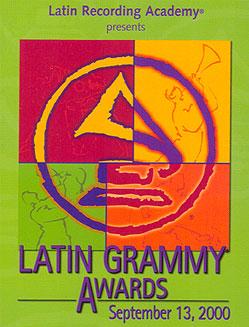
Gloria María Milagrosa Estefan is a Cuban-American singer, actress, and businesswoman. Estefan is an eight-time Grammy Award winner, a Presidential Medal of Freedom recipient, and has been named one of the Top 100 greatest artists of all time by both VH1 and Billboard. Estefan's record sales exceed 100 million worldwide, making her one of the best-selling female singers of all-time. Many of Estefan's songs became international chart-topping hits, including "1-2-3", "Don't Wanna Lose You", "Coming Out of the Dark", "Turn the Beat Around", and "Heaven's What I Feel". Other hits include "Bad Boy", "Rhythm Is Gonna Get You", "Get On Your Feet", and "You'll Be Mine ".

"Ojos Así" is a song by Colombian singer Shakira from her fourth studio album, Dónde Están los Ladrones? (1998). Infused with nuances of Arabic pop, the lyrics tell of the singer traveling the world but not having seen eyes like her lover's. It was released as the album's fifth single in October 1999 by Sony Discos. It was written by Shakira, composed and produced by her, Pablo Flores, and Javier Garza. The song was later adapted into English by Gloria Estefan as "Eyes Like Yours" and included on her first English studio album Laundry Service (2001).

"Ciega, Sordomuda" is a song by Colombian singer Shakira from her fourth studio album, Dónde Están los Ladrones? (1998). A pop rock track, it utilizes mariachi trumpets and lyrically equates total love to a person being blind, deaf, and mute. It was released as the album's lead single on 4 September 1998 by Columbia Records and Sony Discos. The lyrics were written by Shakira. Its music was co-composed by Shakira and Estéfano, while produced by the singer and Lester Méndez.

Arrasando is the seventh studio album by Mexican singer Thalía, released on 25 April 2000, by EMI Latin. She collaborated with producers like Emilio Estefan, Roberto Blades and Lawrence Dermer. In many interviews during the album launch, Thalía said that this album was different from her previous ones, because it shows her turn to a more dance/techno-influenced sound, describing it as a fusion between many types of music. Thalía co-wrote eight songs on the album, in addition, it includes two covers: the South African hit "Pata Pata" and Gloria Estefan's "Lucky Girl".

Gloria! is the eighth studio album released by Cuban-American singer-songwriter Gloria Estefan, released on June 2, 1998, by Epic Records.

Alma Caribeña - Caribbean Soul is the ninth studio solo album and third Spanish album recorded by Cuban-American singer-songwriter Gloria Estefan. It was first released by Epic Records in France on May 9, 2000, and in North America on May 23, 2000.

90 Millas is the eleventh solo studio album by the Cuban-American singer-songwriter Gloria Estefan, and her fourth Spanish language album, coming after Mi Tierra, Abriendo Puertas and Alma Caribeña. It was released on September 17, 2007 by SonyBMG. All original material, the album contains a selection of various Cuban rhythms mixed with Latin-American contemporary pop.

The 1st Annual Latin Grammy Awards were held in Los Angeles at the Staples Center on Wednesday, September 13, 2000. The big winners were Luis Miguel, Santana and Maná with 3 awards; Juan Luis Guerra, Shakira, Fito Páez and Emilio Estefan Jr. received 2 awards each.

"Cómo Me Duele Perderte" is a song by Cuban American singer Gloria Estefan from her ninth studio album, Alma Caribeña (2000). The song was written by Marco Flores with her husband Emilio Estefan and Roberto Blades handling its production. It was released as the album's second single by Epic Records on July 10, 2000. "Cómo Me Duele Perderte" is a salsa and bachata track that narrates the singer in pain of losing someone. The song was met with unfavorable reactions from music critics who criticized its arrangements and the singer's efforts. Commercially, the song topped the Billboard Hot Latin Songs and Tropical Airplay charts in the United States, while also peaking at number 12 on the Dance Club Songs chart in the same country and number eight in Spain. The accompanying music video was directed by Emilio, filmed in Miami, Florida, and features dramatic scenes of Estefan in front of a mirror remembering her former lover.

"Abriendo Puertas" is a song from Cuban American singer-songwriter Gloria Estefan's sixth studio album, of the same name (1995). The song was written by Kike Santander, who handled production alongside Gloria's husband Emilio Estefan. It was released as the lead single from the album on September 19, 1995. The song is a vallenato and son cubano tune that metaphorically deals with opening doors and closing wounds. Its music video features Estefan performing the song while also showing scenes of farmers planting crops. The song received positive reactions from music critics, who mostly praised the instruments. Commercially, it topped both Billboard's Hot Latin Songs and Tropical Airplay charts in the United States and peaked at number three on the Dance Club Songs chart as well.

"Píntame De Colores" is a song recorded by Cuban-American singer Gloria Estefan for her fourth Spanish-language and eleventh studio album, 90 Millas. The song was written by Gloria Estefan and her husband, Emilio Estefan Jr. and Gaitanes and production was credited to Estefan Jr. and Gaitanes. The single was released by SonyBMG in November 2007 digitally as first promotional-only single from 90 Millas to Europe and third overall single to the United States.

"Con Los Años Que Me Quedan" is a song by Cuban American singer Gloria Estefan from her third studio album, Mi Tierra (1993). The song was written by the artist and her husband Emilio Estefan, with Emilio, Jorge Casas, and Clay Ostwald handling its production. An English-language version titled "If We Were Lovers" was also recorded. It was released as the second single from the album in 1993 by Epic Records. A pop bolero ballad, it speaks of an melancholy lament. The song received positive reactions from music critics, who saw it as one of the best tracks from the album.

"Mi Tierra" is a song by Cuban American singer Gloria Estefan, from her third studio album of the same name (1993). It was written by Estefano and the artist, with her husband Emilio Estefan, Jorge Casas, and Clay Ostwald handling the production. The song was released as the lead single from the album in 1993 by Epic Records. It is a son montuno track in which the singer narrates longing for her homeland. The song received positive reactions from music critics, who praised its arrangement.

The discography of singles, promo singles, remixes and Latin tracks for Cuban-American singer Gloria Estefan and Miami Sound Machine consists of 50 singles and 24 promotional singles. Miami Sound Machine began releasing singles in 1977 and continued until 1989, when Estefan began being credited solely as a solo artist. Miami Sound Machine released a number of commercially successful singles through the late 1980s, including "Conga", "Dr. Beat", "Anything for You", and "Bad Boy". Although Miami Sound Machine was no longer featured in the credits of releases from 1989 onwards, they remain Estefan's backing group until this day, though none of the original members remain.

"Entre el Mar y una Estrella" is a song by Mexican singer Thalía from her sixth studio album, Arrasando (2000). It was released as the album's lead single on 27 March 2000 by EMI Latin. The song was written and co-produced by Emilio Estefan and Marco Flores. The track is a pop ballad that deals with lost love and the song was dedicated to her former lover, Alfredo Díaz Ordaz, who died in 1993.

The 90 Millas World Tour is the seventh concert tour by singer and songwriter Gloria Estefan, the tour was performed primarily for her Spanish audience but also for the Dutch, Irish and British who have been her most ardent supporters.

"Vuélveme a Querer" is a song written and produced by Jorge Avendaño Lührs and performed by Mexican recording artist Cristian Castro for the compilation album Boleros: Por Amor y Desamor (1995). The song speaks of a protagonist who yearns for his lover to return. In the United States, the song peaked at number two on the Billboard Hot Latin Songs and number one on the Billboard Latin Pop Songs chart. It received a Billboard Latin Music Award and a Lo Nuestro nomination for Pop Song of the Year the following year. Avendaño received an award in the Pop/Rock category at the American Society of Composers, Authors and Publishers (ASCAP) Awards of 1997
Paquito Hechavarría was a Cuban pianist. Hechavarría built his career in Cuba by playing in some of the most popular orchestras, including Conjunto Casino, Orquesta Riverside and Los Armónicos. However, he is primarily known for his later work with Miami Sound Machine, the band that catapulted Gloria Estefan to international stardom. He has collaborated with popular artists such as David Byrne, Santana and Christina Aguilera.
The 8th annual Billboard Latin Music Awards which honor the most popular albums, songs, and performers in Latin music took place in Miami.
















